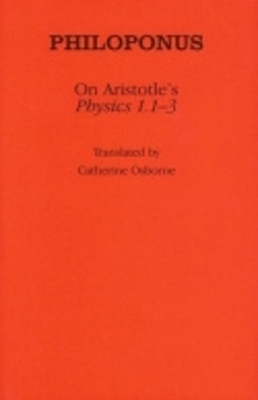In this, the first half of Philoponus' analysis of book one of "Aristotle's Physics", the principal themes are metaphysical. Aristotle's opening chapter in the "Physics" is an abstract reflection on methodology for the investigation of nature, 'physics'. Aristotle suggests that one must proceed from things that are familiar but vague, and derive more precise but less obvious principles to constitute genuine knowledge. His controversial claim that this is to progress from the universal to the more particular occasions extensive apologetic exegesis, typical of Philoponus' meticulous and somewhat pedantic method. Philoponus explains away the apparent conflict between the 'didactic method' (unavoidable in physics) and the strict demonstrative method described in the "Analytics". After 20 pages on chapter 1, Philoponus devotes the remaining 66 pages to Aristotle's objections to two major Presocratic thinkers, Parmenides and Melissus. Aristotle included these thinkers as an aside, because they were not engaged in physics, but in questioning the very basis of physics. Philoponus investigates Aristotle's claims about the relation between a science and its axioms, explores alternative ways of formalising Aristotle's refutation of Eleatic monism and provides a sustained critique of Aristotle's analysis of the Eleatics' purported mistakes about unity and being.
- ISBN10 0801444411
- ISBN13 9780801444418
- Publish Date 23 March 2006
- Publish Status Active
- Out of Print 15 March 2021
- Publish Country US
- Imprint Cornell University Press
- Format Hardcover
- Pages 160
- Language English
